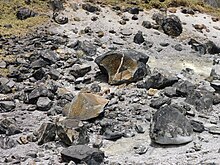Sessho-seki
37°06′06″N 139°59′55″E / 37.1016692°N 139.9985806°E

The Sessho-seki (殺生石, Sesshōseki), or "Killing Stone", is a stone in the volcanic mountains of Nasu, an area of Tochigi Prefecture, Japan, that is famous for sulphurous hot springs. In Japanese mythology, the stone is said to kill anyone who comes into contact with it.[1] In Japan, rocks and large stones in areas where volcanic toxic gases are generated are often named Sessho-seki (殺生石), meaning Killing Stone, and the representative of such stones is this one associated with the legend of Tamamo-no-Mae and the nine-tailed fox.[2]
Legend
[edit]The stone is believed to be the transformed corpse of Tamamo-no-Mae, a beautiful woman who was exposed as a nine-tailed fox working for an evil daimyō plotting to kill Emperor Konoe and take his throne. According to the otogi-zōshi, when the nine-tailed fox was killed by the famous warrior named Miura-no-suke, her body became the Sessho-seki. Later, a Buddhist priest called Genno stopped for a rest near the stone and was threatened by the spirit of Tamamo-no-Mae. Genno performed exorcism rituals and begged the spirit to consider her salvation. Tamamo-no-Mae relented and swore never to haunt the stone again.[2]
Split
[edit]
It was reported on March 5, 2022 that the stone had split into two parts, likely as a result of natural weathering. Some netizens expressed their fear of the exorcised Kitsune.[3] On 26 March 2022, the local government had priests host a ceremony to appease the spirit and pacify the beast at the site with prayers, offerings, and waving haraegushi upon the split rock.[4]
In literature
[edit]- A Noh play about the stone, attributed to Hiyoshi Sa'ami.[5]
- It was mentioned in Oku no Hosomichi by Matsuo Bashō as he visited the stone in the 17th century and tells of his visit in his book (Narrow Road to the Deep North).
- Tamamo-no-Mae, a novel by Kido Okamoto, was based on the legend of the stone. A film adaptation, Kyuubi no Kitsune to Tobimaru (Sesshouseki) followed.
- In chapter 123 of the manga Bakidou the author used the story of the rock breaking to show the kick power of one of the characters.
Gallery
[edit]-
Entrance to the area
-
A thousand Jizōs at the site
-
Print by Toriyama Sekien
-
Print by Yoshitoshi
See also
[edit]References
[edit]- ^ "殺生石 真っ二つ 以前からひび、自然現象か 那須|社会,県内主要|下野新聞「SOON」ニュース|下野新聞 SOON(スーン)". 下野新聞 SOON (in Japanese). Retrieved 2022-03-06.
- ^ a b Sessho-seki. Kotobank.
- ^ McCurry, Justin (7 March 2022). "Japan's 'killing stone' splits in two, releasing superstitions amid the sulphur springs". The Guardian. Retrieved 7 March 2022.
- ^ McGee, Oona (2022-03-28). "Mist descends upon Japan's "Killing Stone" after ceremony to appease nine-tailed fox spirit". Sora News 24. Retrieved 2022-03-30.
- ^ "Sesshoseki play" " Sesshōseki (殺生石) | .Theatre Nohgaku Blog. Retrieved September 11, 2018.
- "Station 9 – Sesshoseki". Basho's World. Archived from the original on December 26, 2004. Retrieved February 23, 2006.
- "Tamamo-no-mae (Synopsis)". Enjoying Otogi Zoshi with the Help of Synopsis and Illustrations. Archived from the original on July 10, 2006. Retrieved February 22, 2006.






